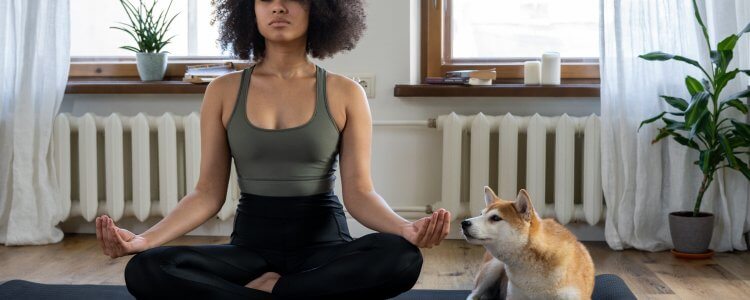5 Tips for Leading a Stress-Free Life
 By Jonathan Owen
By Jonathan Owen Marketing Manager
Published
3rd November 2020
Last modified 20th June 2023
Last modified 20th June 2023
loveit? shareit!

From time to time, everyday responsibilities can take a toll on our mental health. Whether it’s a serious life event, work pressures or family crises, there are many factors which can trigger feelings of stress or and anxiety. According to a study by the Mental Health Foundation, 74% of adults have felt stressed at some point over the past year.
In addition, higher stress levels can impact our relationships, as well as our general well-being. If you’re experiencing emotional or physical stress, there are plenty of ways you can manage it and combat those negative feelings.
Here are a few quick tips for de-stressing and boosting your quality of life!
Regular exercise is one of the best ways for boosting your mood and reducing stress symptoms; as the saying goes, ‘Healthy body, Healthy mind.’ Physical activity releases endorphins to the brain which help to naturally relieve stress and anxiety hormones.
Exercise also improves your overall health, including sleep quality, fitness level and muscle strength. Almost any form of exercise can work as a stress reliever, but in particular, according to a cross-sectional survey on Yoga practice in the UK, 16% of participants reported starting yoga to manage a physical or mental health condition. Also the ‘Psychology of Sport and Exercise’ meta-analysis by Reed J & Buck found that low-intensity aerobic exercise – 30-35 minutes, 3-5 days a week, for 10-12 weeks – was most effective at increasing positive moods.
Getting enough sleep each day is important for both our wellbeing and mental health. It supports us physically, by boosting our energy and improving our immune system and brain function, as well as psychologically, by relaxing the body, enhancing our mood and lowering stress levels.
Good quality sleep allows our bodies to recharge and re-energise cells so that our minds can operate at their full potential. Plenty of rest gives our mind the ability to switch off and revive itself. This helps to maintain emotional balance and reduces anxiety and stress.
Using sleep technology devices can make it easier to get a blissful night. For example, sleep monitoring apps are designed to calm your mind and help you fall asleep faster so you wake up feeling more refreshed. Advanced sleep monitors also keep track of your sleep cycle and monitor REM (Rapid Eye Movement). What’s more, you can get electronic gadgets for creating a more relaxed atmosphere in the bedroom, such as sunlight lamps, sound machines and climate controlled bedding.
There are also positive lifestyle and sleep habit changes which you can implement to ensure you get better quality sleep; from being more active, establishing an earlier bedtime routine, creating a comfortable bedroom setting to avoiding caffeine or heavy meals late at night.
To combat stress or anxiety, you’ll need to be able to address your symptoms. This can be achieved through counselling or talk therapies which help to change your negative thinking and behaviours. So you are able to process complex feelings and express emotions more effectively.
Cognitive behavioral therapy is used all over the world to support those suffering with emotional problems, including fears, stress, anxiety, phobias and depression. This treatment is a type of talk therapy, which focuses on improving a person’s holistic health by helping them to identify, manage and cope with the triggers of anxiety.
Another natural remedy to relieve stress is self-care. Taking care of yourself is important for your mental health as it helps to give your mind a break and escape from all your stresses and responsibilities.
Whether you prefer beauty and pampering, relaxation exercises or leisure activities, practising effective self-care can provide many benefits, such as easing anxieties to busting stress. Wellness and meditation apps are the perfect self-care therapy addition, as they can teach you mindfulness techniques, such as creating a sense of calm and peace, detecting different body sensations, observing thoughts and feelings and changing the way you handle stress.
Here are some more self-care ideas you could include in your daily routine:
Regular communication with family and friends is key for helping maintain a healthy mind and fixing your stress or worries. Face-to-face interaction allows you to express your emotions with others and spend quality time with those who help lift your spirits.
Whether this is through video call or meeting up in person, being able to talk with your loved ones is a good way to share your worries and maintain a close network. Building relationships and socially connecting with new people can also enhance resilience to stress and regulate our mood.